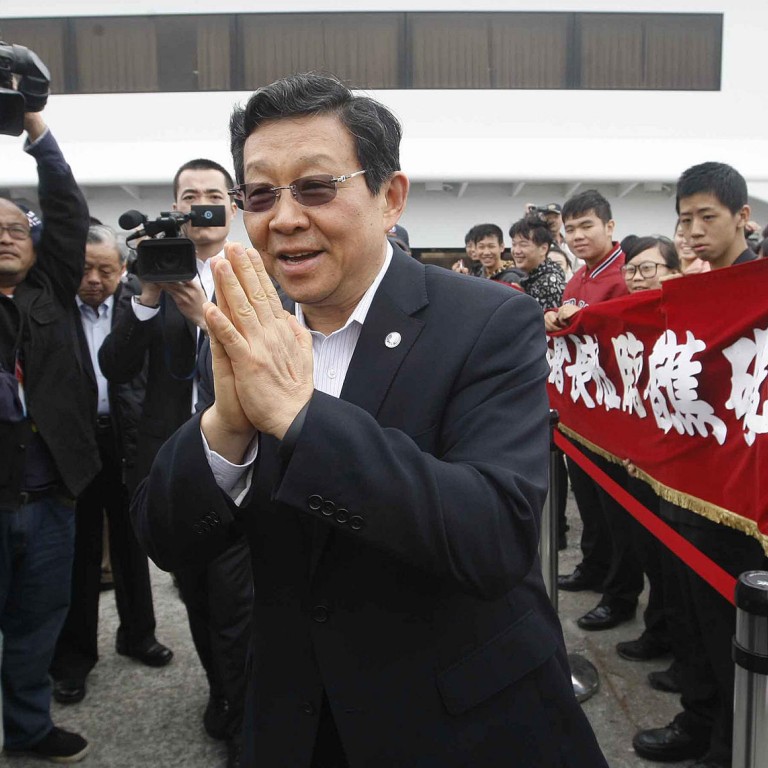
Success of Beijing envoy's visit to Taiwan shows 'attitudes warming'
Smaller scale of protests in Taiwan during mainland envoy's visit suggests policy of closer ties and cross-strait co-operation is paying off
The visit to Taiwan by top envoy Chen Deming has shown Beijing's policy in dealing with the island has largely been successful, with a marked reduction in deep-seated hostility towards the mainland.
Leading a 70-member strong delegation of mainland officials and business leaders, Chen arrived in Taiwan on November 26 for an eight-day visit. It was his first as the head of the Association for Relations Across the Taiwan Strait, which handles contacts with the island in the absence of formal diplomatic ties.
"To see and learn is the major purpose of my visit, which will be limited to the private sector and the development of Taiwan's free-economic pilot zones," Chen told journalists on the eve of his departure for Taiwan.
He steered clear of speculation he would pressure the government of the island's president, Ma Ying-jeou, to ensure the legislature pass a cross-strait service trade agreement during his trip. Chen also said he was ready to face protests throughout his visit and was "psychologically prepared to hear different voices". Several civic and pro-independence groups had announced plans to stage a handful of protests to voice opposition to the trade service pact signed by Taipei and Beijing in June, which has yet to be approved by the legislature. They called it a malicious agreement that would be harmful to Taiwan's interests.
Chen's arrival came three days after the mainland ratcheted up regional tensions by announcing the creation of an air defence identification zone in the East China Sea. The zone not only overlaps the airspace monitored by Taiwan and South Korea, but also includes the disputed Diaoyu Islands, which are claimed by Taiwan and Japan, which calls them the Senkakus.
Pro-independence supporters in Taiwan were enraged, viewing the zone as a violation of the island's sovereignty.
As expected, Chen did encounter protests staged by opponents who had vowed to "shadow" him everywhere he visited on the island.
But compared to those encountered by his predecessor Chen Yunlin , who first visited the island as the association's chief in November 2008, the scale of protests was much smaller.
The number of protesters slid to less than 200 and sometimes even fewer than a dozen, a sharp contrast to the demonstrations in 2008 attended by tens of thousands, some of which ended in violence, if not bloodshed.
Even the main opposition Democratic Progressive Party - which backs independence for Taiwan - did not organise any protests against Chen's visit.
In 2008, it mobilised tens of thousands of protesters to demonstrate day and night outside the hotel of Chen Yunlin.
Wu Poh-hsiung, honorary chairman of the Kuomintang, jokingly told Chen Deming at a banquet he hosted for the envoy on the final night of his visit: "The dinner this time will take only two hours, unlike the one which took eight hours to finish in 2008."
Chen responded: "This is the biggest progress" in terms of cross-strait relations.
Wu was referring to an incident in November 2008, when Chen Yunlin was trapped in a Taipei hotel where a dinner was held in his honour, as thousands of pro-independence activists surrounded the building.
At the time, he was the most senior mainland official to visit the island.
Wang Kung-yi, a professor of international and strategic studies at Tamkang University in Taipei, said the contrast between the two visits showed how successfully Beijing's policy of favouring economic benefits - such as trade and travel - and generally adopting a warmer stance had changed the mindset of Taiwanese people.
"Cross-strait relations have become so close that the so-called 'united front' ploy in wooing Taiwanese is no longer the right term to explain why most people in Taiwan have become less hostile towards the mainland," Wang said.
Taiwan and the mainland became bitter rivals after the end of a civil war in 1949, but their relations began to improve dramatically when Ma became president in 2008 and adopted a policy of engagement with Beijing.
Analysts said that in addition to expanded cross-strait exchanges, including frequent visits by tourists and senior officials, the rise of the mainland as a global economic power had prompted more Taiwanese to appreciate the market opportunities the growth has brought.
Wang said Chen, a former commerce minister, was expected to find ways to further economic co-operation with Taiwan to pave the way for unification - Beijing's eventual aim.
"Co-operation on the free trade or economic pilot zones between the two sides and their development as special cross-strait zones would be the mainland's next target to help speed up economic integration," Wang said.
Liu Meng-chun, a researcher with the Chung-Hua Institution for Economic Research, said the mainland has been keen to work closely with Taiwan beyond the co-operation that has arisen from the trade pact they signed in 2010. "Using free trade or economic pilot zones in Taiwan and Shanghai as a kind of special zone-to-special-zone collaboration would be an innovative way to increase future cross-strait co-operation," he said.

